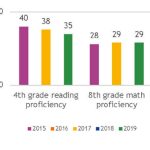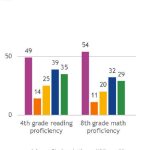The lifeblood of any great school is great teaching. As the Prichard Committee report published in December of 2020 succinctly put it: Teaching Matters Most.
In order to achieve educational excellence through equity in the Commonwealth, quality teaching must be at the core of the discussion. Exemplary teaching can be a foundation for an equitable future, as well as a Big Bold Future for students in Kentucky.
Teaching Excellence with Equity
In our Big Bold Future report, two of the indicators of a successful educational foundation were reading proficiency in 4th grade and math proficiency in 8th grade. According to the National Assessment of Educational Progress Report Card from 2019, Kentucky ranks 26th and 39th in those metrics, respectively. Approximately 35% of Kentucky students were reading at a level of proficient or higher by their 4th grade year, while 29% were proficient or better in math by their 8th grade year.

The goal should be to ensure the 100% of students would be performing at a proficient level in both reading and math indicators. Kentucky has a way to go to reach that goal. As we look at students across the Commonwealth, we also see that there are gaps in performance across racial and socioeconomic demographics of students.

How Can Teachers Be Supported in Turning This Around
The approaches to turning around our reading and math performance for Kentucky student’s needs to be multi-faceted and robust, with an eye on equity at the core. The call for a new approach to literacy and math teaching is needed to support our teachers in delivering improved outcomes for their students. Some of the recommendations made in Teaching Matters Most include:
- The Department of Education implementing a state-wide professional development program to support early literacy and math instruction across the early childhood and elementary landscape, and
- The Department of Education training and developing literacy and math coaches to deploy to the lowest performing school districts.
Observing the demographic data, there is research from The Long-Run Impacts of Same Race Teachers that supports improved educational outcomes for students of color that are taught by teachers of color. Data from the Kentucky Department of Education in 2019-2020 indicates that, while over 10% of Kentucky students identify as Black and nearly 8% of Kentucky students identify as LatinX, under 5% of teachers across the Commonwealth identify as a person of color.
This does not even begin to address the need for cultural competency training to help our teachers to understand diverse cultural needs of students and to ensure that they have the tools to communicate effectively across cultural lines, as well as design culturally relevant assignments and lessons for students.
Recommendations from Teaching Matters Most include:
- Partnership between the Council on Postsecondary Education, the Department of Education, and the Education Professional Standards Board to create an action plan to increase diversity in the teacher workforce, and
- Collaboration between the Council on Postsecondary Education, the Department of Education, and the Education Professional Standards Board on how to include sustained cultural competency training in both teacher prep programs, as well as professional development to improve reading and math.





Comments are closed.